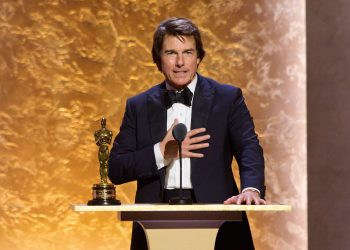It’s taken over twenty years to bring Carol to the big screen. The story of wife and mother Carol (Cate Blanchett) falling in love with shop girl Therese (Rooney Mara) has been highly anticipated ever since its premiere in Cannes earlier this year.
I sat down with producer Elizabeth Karlsen to find out why she stuck with it so long, and the challenges she faced.

Awards Daily: I spoke to Phyllis [Nagy] yesterday, I couldn’t believe she spent over twenty years trying to get this project done. At what stage did it get to you?
EK: Phyllis came in to see me in my office fifteen years ago. She pitched a couple of projects, and one of them I loved, Mrs. Harris, and I had a certain connection to that story so I commissioned her to write the screen play which we ended up writing for HBO with Annette Bening and Ben Kingsley. While we were filming Mrs. Harris, Phyllis mentioned Carol to me. I hadn’t read the novel, but I had The Talented Mister Ripley by Patricia Highsmith, and I loved that. I read it and I loved it, but I said I’d love to do it, but the novel rights weren’t available, and this was in 2003/4. So I waited and waited, and finally in 2010, the rights became free, and I like a terrier I went after them. I said, I wanted to buy the rights; the publisher said they didn’t want to sell them because nothing had happened for years and years. So, I flew to Zürich, had lunch with them and somehow convinced them to sell the rights to me, and that I wouldn’t let them down. I knew other people were after the rights too, but I was determined that this was my movie and that I was going to make it. So I called Tessa Ross at Film 4 who said, “I’m in, we’re here for you. Whatever you need.” I said, “I need to take your lawyer at Film 4. I need to hire a Swiss lawyer. I need to go back to Zürich and just sit around the table and just close the deal. That’s what happened. I called Phyllis after that, and I told her I had the rights. She actually said, “No, I’ve had too much heartache. I can’t go back there, it’s too painful, and I can’t do it.” I told her she needed to do it, I also told her I’d make it without her, but the next day, she called and said she was in.
We started developing it. Cate (Blanchett) was attached, but it went through several directors and it didn’t work out, and it really just fell apart. I was speaking to Christine Vachon about it, and it turned out that Todd [Haynes] didn’t have a movie. I had a script with no movie, and Todd came on board in May 2011, by which time Stephen [Wooley] and I had financed the whole thing. With Todd coming on board, Cate was in. We started pre-production in February 2012.
AD: So, why did you stick at this, why didn’t you ever give up?
EK: I find professionally that stories get under your skin, and they keep coming to you. I just knew this was the film I wanted to do.
AD: It’s truly a beautiful film.
EK: Todd is amazing. Without sounding pretentious, he’s a genius at mise en scène. Not only is he an absolute artist and intellectual, but he’s a collaborative spirit, he’s so engaging and generous. It started in his relationship with Phyllis where they worked on the screenplay together, and the screenplay got stronger, and they had a great time together. Then Todd bringing Cate, and he brought so much into this film. The sheer beauty of this film does not drown out the emotion of the character. It’s also a love story, and it’s not often you get those two aspects coming together where something resonates as a story, and yet is a thing of mesmerizing, transcendent beauty.
AD: That’s something I really love about it, it’s totally a universal story.
EK: Absolutely. It’s an exhilarating love story.

AD: What made you choose Cincinnati?
EK: The budget came in for New York and it was practically double the amount of money that we were going to be able to raise. Even if we tried to cut the budget, it was really just a non-starter. We looked at Canada. Todd had already done I’m Not There in Montreal. He was very nervous about what he needed to shoot New York in the way he wanted to, he couldn’t split locations. Steve Woolley and I had shot Rage in Harlem 27 years ago in Cincinnati. Stephen said I should look at Cincinnati, and my first thought was there was no way it was going to look the way it did 27 years ago.
London has changed beyond recognition in 27 years, many cities here have had their architecture preserved, I think I was Googling the city while on the phone to the line producer. I wondered about the tax break, and it came up that they had this incredible tax rebate, and in that moment, I thought this was where the financial and creative inheritance collide.
We went on a location scout (Cleveland, Montreal, and Cincinnati) with Todd, and when we got there, he couldn’t believe what was before his eyes, and he made it work.
AD: Aside from the challenge of getting the film to screen, what other challenges were you faced with?
EK: There were just so many challenges, not just in bringing it to the screen. Financing as well, when you make a period film, it’s expensive. When you work with a director like Todd Haynes who has such a visual aesthetic that is known and celebrated, I think he’s one of the great contemporary American directors who has never been nominated for an Academy Award [in Direction], it’s unbelievable.
AD: I know. That fact just blows my mind.
EK: It’s really unbelievable. So, as a producer when you work on a film by Todd Haynes, you need to deliver a film by Todd Haynes, and there’s no point in hiring the likes of Sandy Powell and Judy Becker if you can’t give them what they need. These are people at the top of their game. There’s a real push and pull of keeping the budget, but making sure you deliver to your distributors what they expect. So, that was challenging.
You also have Cate and Todd, but you also have a film with two women, both are lesbians, it’s a period movie, and Todd Haynes has never made a box office hit, so there’s this prototype in the marketplace which really wasn’t enough. Also the movie was shot in 35 days, and that was extremely challenging to shoot what you see on screen in that period.
AD: You really can’t tell that when you see the final product. It’s truly beautiful, from the score to the costumes, to the sets and the script.
EK: Thank you so much. I can’t tell you how much that means. Everyone sets out to make a great film, but you never know how people will respond. You don’t know how the critics will respond, and you don’t know how the audience will respond.
AD: You’ve also produced Youth, out next month.
EK: Paolo is a genius. He came from relationships that go back over thirty years. I told Stephen we needed to go to Rome. Stephen and I had seen the script, we’d both worked with Michael Caine. We took them out and that sealed it. It’s a great film and I love it.
AD: Tell us about your journey, it’s really impressive, going from London to LA.
EK: I’ve always loved cinema and film. I went to university to study genetics. I had taken a year off and wasn’t sure I had made the right decision. I ended up changing to read English and there was a woman there, Jacqueline Rose was instrumental in that, so I did a post-graduate with her. When I finished that, I moved to New York and worked as a proofreader. My first job was on the set of Parting Glances. I met Stephen. Working in different departments, the director took me under his wing and taught me how to edit.
I went back to England, and got a job working at Palace which was the most incredible independent production. They did Nightmare on Elm Street, Evil Dead, Betty Blue and Scandal.
So, that’s where I started. Tom Rothman was a senior lawyer on Parting Glances and was a big inspiration because he told me I should be a producer. Stephen was a big inspiration.
The highs are high, the lows are low, and it’s really something that you just keep on.
AD: Sarah Gavron said the other day that over 90% of films we watch are directed by men.
EK: I think it’s higher, 93%.
AD: As a female film-maker, what do you think needs to be done to change that?
EK: I’m hoping it’s something that’s bottom up and top down. I was thinking about it today because one of the guys who interviewed me asked about that. I didn’t say this to him, but you are the first woman all day who has interviewed us. It’s all been men. Tomorrow, we see Anne Thompson. It just made me think that that’s a part of the problem, which is a problem that goes across all walks of society, it’s not something just specific to the film industry.
You’re the only woman I’ve spoken to today. The distributors are all run by men, the film festivals are run by men, the financiers. It’s male dominated across the board, and there’s no way that it doesn’t affect what gets commissioned and what gets made and what people see. I think the only way to change it is to change things at all levels. Young girls need to be mentored, taught and told that they can be writers, journalists and directors. All of those things that they’re excluded from at a very young age for various reasons. The exclusion comes in general forms. I’m talking here in the US because exclusion in other countries comes at a much deeper insidious level.
The other problem is women’s history has also been silenced, so when there are stories like The Theory of Everything and Everest, the list goes on. History is men’s history, so you have to uncover these stories, you run into a problem, because when you want to tell the stories, people say, “What? Who was that? What did she do?”
We need to be making a history now going forward for them.













